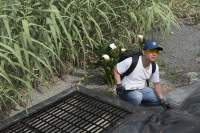- Forum
- categories
- Sanitation systems
- Water supply
- Groundwater (pollution, management, usage)
- Linkage of Pit latrine usage and pollution of groundwater
Linkage of Pit latrine usage and pollution of groundwater
8013 views
Couldn't agree more. It is a very noble exercise to ensure that water is treated when ground water sources are polluted, but it would be far better to construct toilets that do not contribute to that pollution in the first place.
It still completely baffles me that we find it acceptable for people to be encouraged to construct pit toilets anywhere in the world, when we in the 'west' would only use them in only the most extraordinary of circumstances (i.e. camping where no facilities are available).
There are excellent options in UDDTs or Twin Chamber that may cost more to construct, but are a much better long-term solution. As I say frequently, are we just constructing toilets or investing in sanitation? To me there is a big difference.
It still completely baffles me that we find it acceptable for people to be encouraged to construct pit toilets anywhere in the world, when we in the 'west' would only use them in only the most extraordinary of circumstances (i.e. camping where no facilities are available).
There are excellent options in UDDTs or Twin Chamber that may cost more to construct, but are a much better long-term solution. As I say frequently, are we just constructing toilets or investing in sanitation? To me there is a big difference.
The following user(s) like this post: pkjha, goeco
Please Log in to join the conversation.
You need to login to replyRe: Linkage of Pit latrine usage and pollution of groundwater
Whilst treating of drinking water in these circumstances is a worthwhile exercise in protection there is another intervention that should be employed in the construction of pit latrines, and this is urine diversion. Urine being a highly valued fertilizer is also highly sterile, and only becomes an issue when mixed with faeces. I don't feel comfortable with treating drinking water and leaving pollution in the ground as this is hardly an environmental improvement.
Please Log in to join the conversation.
You need to login to reply- stevensugden
-
 Less
Less- Posts: 32
- Karma: 8
- Likes received: 28
Re: Linkage of Pit latrine usage and pollution of groundwater
There is another way to understanding the risks, which coincidently was also pioneered with the help of BGS and takes the epidemiological approach. It is quick and should become more widely used. This is taken from the abstract of the paper,
Open defecation is practised by over 600 million people in India and there is a strong political drive to
eliminate this through the provision of on-site sanitation in rural areas. However, there are concerns that
the subsequent leaching of excreta from subsurface storage could be adversely impacting underlying
groundwater resources upon which rural populations are almost completely dependent for domestic
water supply. We investigated this link in four villages undergoing sanitary interventions in Bihar State,
India. A total of 150 supplies were sampled for thermotolerant (faecal) coliforms (TTC) and tryptophanlike
fluorescence (TLF): an emerging real-time indicator of faecal contamination. Sanitary risk inspections
were also performed at all sites, including whether a supply was located within 10 m of a toilet, the
recommended minimum separation. Overall, 18% of water supplies contained TTCs, 91% of which were
located within 10 m of a toilet, 58% had TLF above detection limit, and sanitary risk scores were high.
Statistical analysis demonstrated TLF was an effective indicator of TTC presence-absence, with a possibility
of TTCs only where TLF exceeded 0.4 mg/L dissolved tryptophan. Analysis also indicated proximity
to a toilet was the only significant sanitary risk factor predicting TTC presence-absence and the most
significant predictor of TLF. Faecal contamination was considered a result of individual water supply
vulnerability rather than indicative of widespread leaching into the aquifer. Therefore, increasing faecal
contamination of groundwater-derived potable supplies is inevitable across the country as uptake of onsite
sanitation intensifies. Communities need to be aware of this link and implement suitable decentralised
low-cost treatment of water prior to consumption and improve the construction and protection
of new supplies.
Open defecation is practised by over 600 million people in India and there is a strong political drive to
eliminate this through the provision of on-site sanitation in rural areas. However, there are concerns that
the subsequent leaching of excreta from subsurface storage could be adversely impacting underlying
groundwater resources upon which rural populations are almost completely dependent for domestic
water supply. We investigated this link in four villages undergoing sanitary interventions in Bihar State,
India. A total of 150 supplies were sampled for thermotolerant (faecal) coliforms (TTC) and tryptophanlike
fluorescence (TLF): an emerging real-time indicator of faecal contamination. Sanitary risk inspections
were also performed at all sites, including whether a supply was located within 10 m of a toilet, the
recommended minimum separation. Overall, 18% of water supplies contained TTCs, 91% of which were
located within 10 m of a toilet, 58% had TLF above detection limit, and sanitary risk scores were high.
Statistical analysis demonstrated TLF was an effective indicator of TTC presence-absence, with a possibility
of TTCs only where TLF exceeded 0.4 mg/L dissolved tryptophan. Analysis also indicated proximity
to a toilet was the only significant sanitary risk factor predicting TTC presence-absence and the most
significant predictor of TLF. Faecal contamination was considered a result of individual water supply
vulnerability rather than indicative of widespread leaching into the aquifer. Therefore, increasing faecal
contamination of groundwater-derived potable supplies is inevitable across the country as uptake of onsite
sanitation intensifies. Communities need to be aware of this link and implement suitable decentralised
low-cost treatment of water prior to consumption and improve the construction and protection
of new supplies.
Please Log in to join the conversation.
You need to login to replyRe: Linkage of Pit latrine usage and pollution of groundwater
Dear Mr. Aminu,
Please have a look at the attached publication.
Regards,
F H Mughal
Please have a look at the attached publication.
Regards,
F H Mughal
F H Mughal (Mr.)
Karachi, Pakistan
Karachi, Pakistan
This message has an attachment file.
Please log in or register to see it.
Please Log in to join the conversation.
You need to login to reply- Elisabeth
-
- User is blocked
- Freelance consultant since 2012
Less- Posts: 3372
- Karma: 54
- Likes received: 932
Re: Linkage of Pit latrine usage and pollution of groundwater
A good starting point for anyone who is new to this topic is of course also the Wikipedia article on groundwater pollution. It explains the issues and provides some key references at the end. See here:
en.wikipedia.org/wiki/Groundwater_pollution
Myself and a few of the other SuSanA members were involved in writing it over the last two years.
Regards,
Elisabeth
P.S. There is always room for improvement. Do tell us if you find anything missing or unclear.
en.wikipedia.org/wiki/Groundwater_pollution
Myself and a few of the other SuSanA members were involved in writing it over the last two years.
Regards,
Elisabeth
P.S. There is always room for improvement. Do tell us if you find anything missing or unclear.
Dr. Elisabeth von Muench
Freelance consultant on environmental and climate projects
Freelance consultant on environmental and climate projects
Please Log in to join the conversation.
You need to login to reply- JFranciscoDeLeon
-

- Juan Francisco De León Ibarra, Master en Ingeniería Ambiental con especialidad en Tratamiento de aguas residuales, estudió Ingeniería Civil en la Facultad de Ingeniería de la Universidad Nacional Autónoma de México (UNAM). Durante 20 años ha dedicado su labor profesional a trabajar en pro del acceso a los servicios de agua y saneamiento en comunida
Re: Linkage of Pit latrine usage and pollution of groundwater
The presence of Nitrates in Ground Water is directly linkage to the infiltration of Urine from pit latrine, septic tanks and another contention sanitation systems
Regards
JFrancisco
Regards
JFrancisco
Please Log in to join the conversation.
You need to login to reply
Thanks for the question. If you do a search on the SuSanA website. www.susana.org with the search words "pit latrines groundwater" you get 642 results providing both published records, discussion items in this Forum and directly related topics. This is the same as searching in Google but it is curated to include things only relevant to the SuSanA theme. Give it a try.
Regards
Regards
Arno Rosemarin PhD
Stockholm Environment Institute
This email address is being protected from spambots. You need JavaScript enabled to view it.
www.sei.org
www.ecosanres.org
Stockholm Environment Institute
This email address is being protected from spambots. You need JavaScript enabled to view it.
www.sei.org
www.ecosanres.org
Please Log in to join the conversation.
You need to login to reply- mahamaaminu
-
Topic AuthorLess
- Posts: 2
- Likes received: 1
Linkage of Pit latrine usage and pollution of groundwater
Hello,
is their any empirical evidence that suggest association of pit latrine usage and ground water pollution?
this has been a critical issues in rural communities that have constructed local pit latrines.
is their any empirical evidence that suggest association of pit latrine usage and ground water pollution?
this has been a critical issues in rural communities that have constructed local pit latrines.
Please Log in to join the conversation.
You need to login to reply
Share this thread:
- Forum
- categories
- Sanitation systems
- Water supply
- Groundwater (pollution, management, usage)
- Linkage of Pit latrine usage and pollution of groundwater
Recently active users. Who else has been active?
Time to create page: 0.087 seconds








